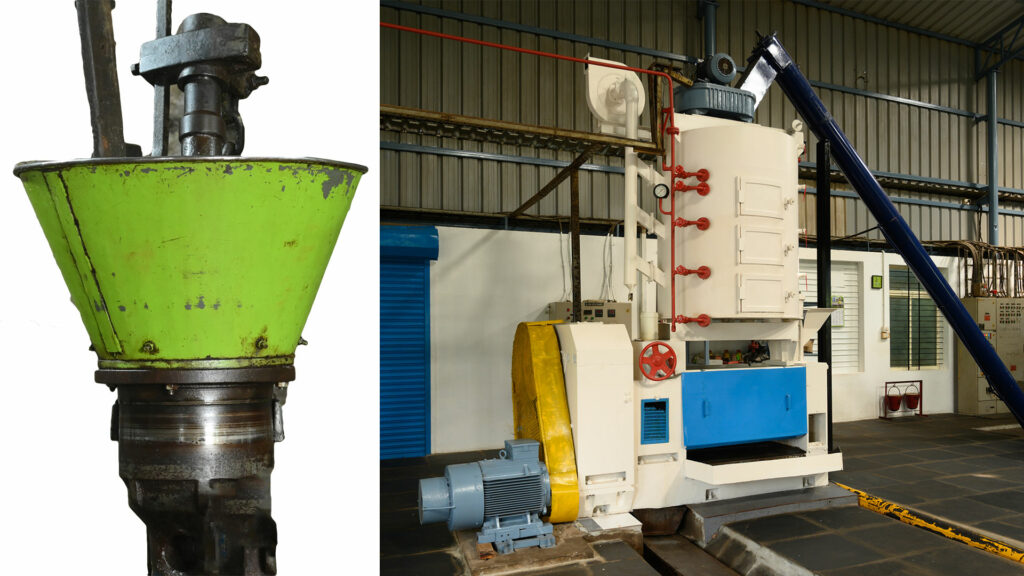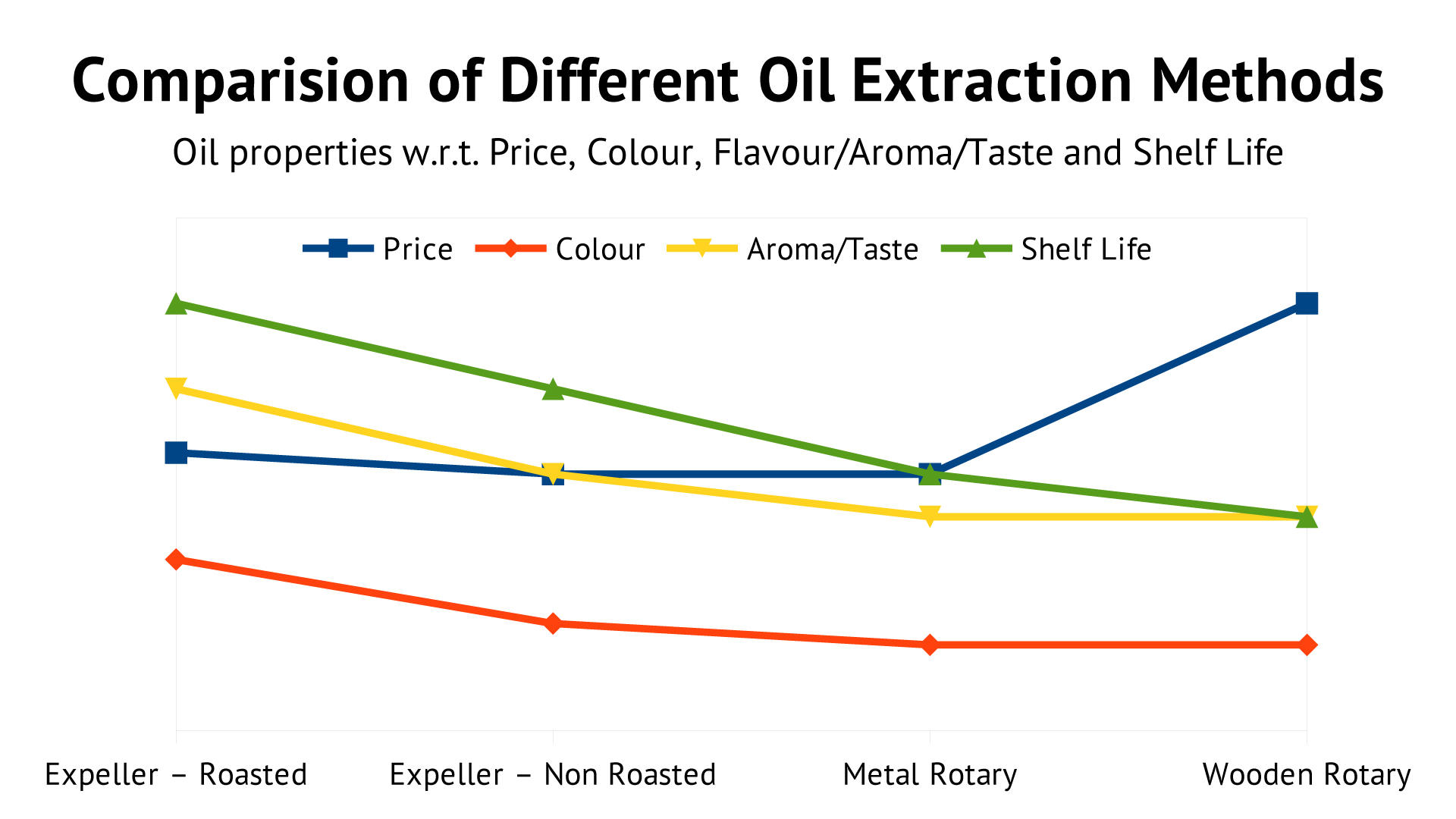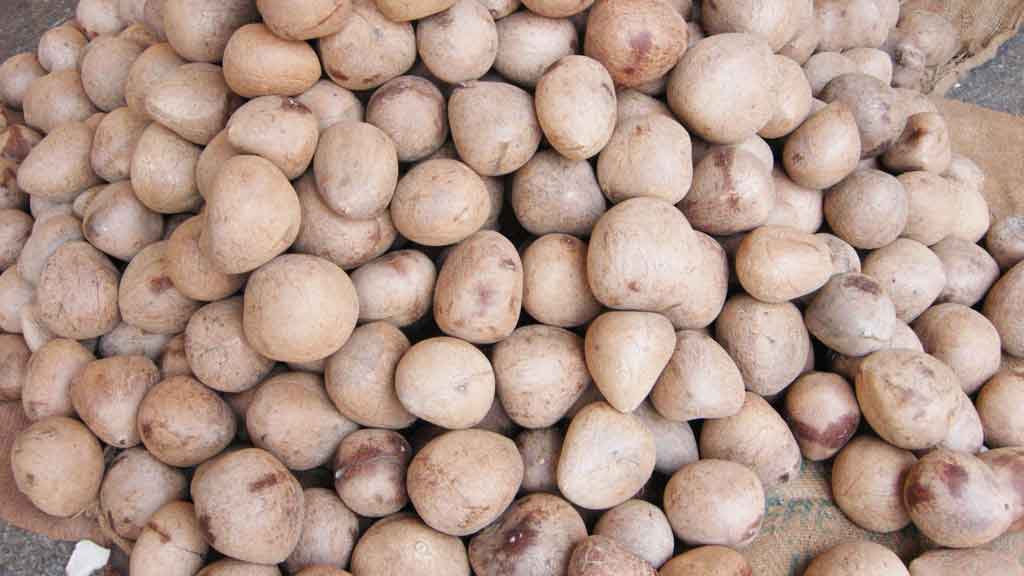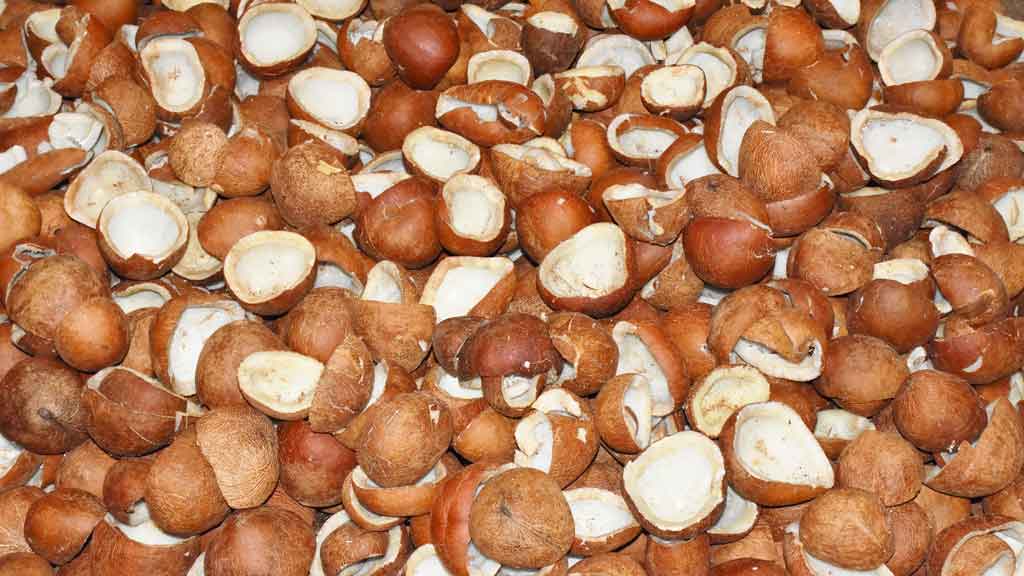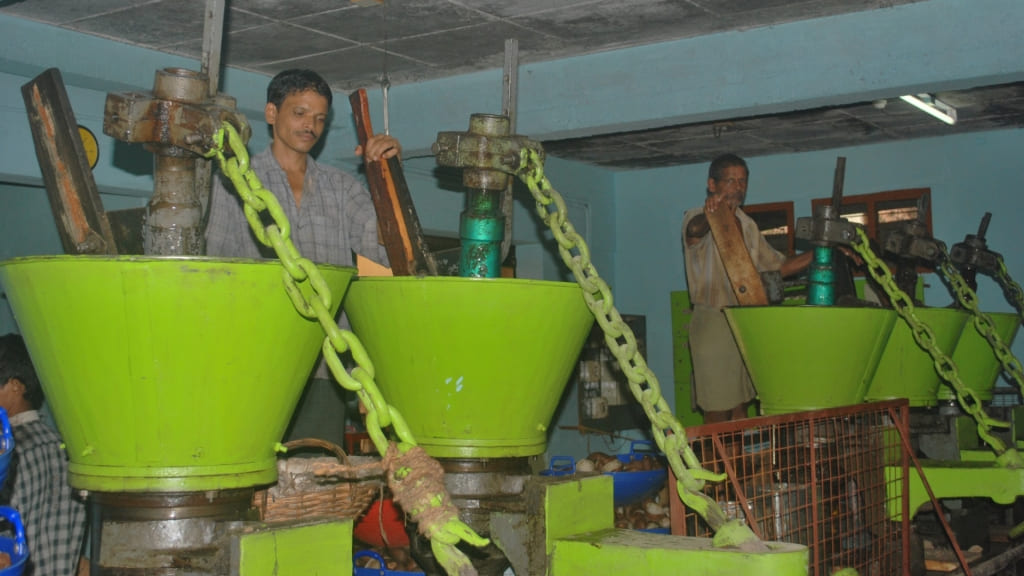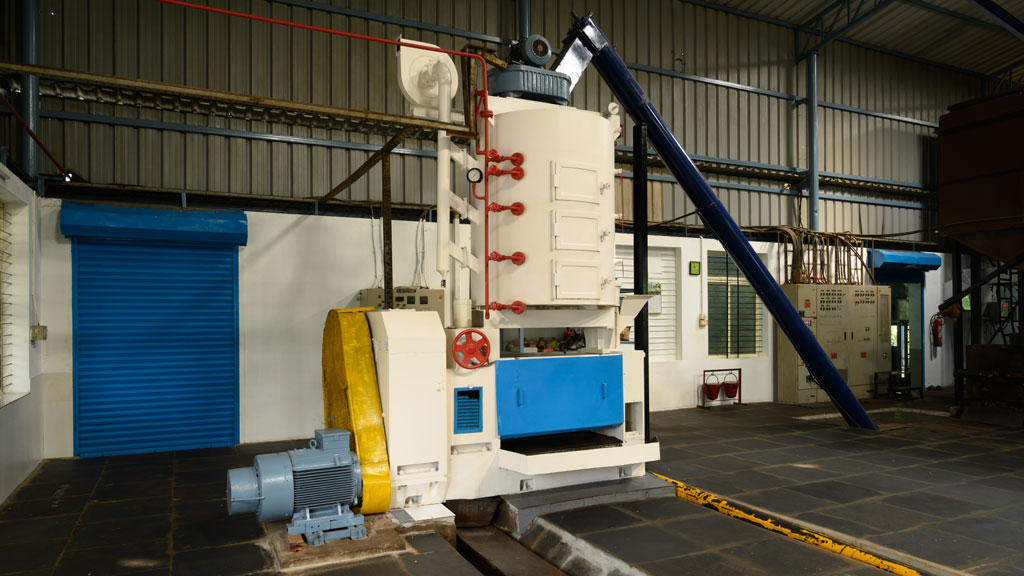Cocoguru brand has been built to benefit the farmers and consumers. It is successfully delivering quality coconut oil to consumers, who have been repaying their faith in us. The brand is growing stronger by the day, it is getting into newer territories, adding more products, and improving its quality. You don’t have to blindly believe us or the rumours, you may consider the following points before you form an opinion:
Premium product
Cocoguru brand is sold at a premium compared to other brands in the local market. So, cutting costs by adulteration is not necessary. It is not sustainable to sell at a premium by delivering inferior adulterated products.
Read more: cocoguru.com/yet-another-price-increase/
Brand
We believe in the power of the brand. We appreciate the fact that the brand as an asset is more valuable than all the physical assets like land, buildings, plant & machinery, saleable inventory, etc. So, every activity we do should be towards building and nurturing the brand. Adulteration or shortcuts are the quickest ways to kill it. Cocoguru brand is already 14 years old and is built to last. We are in it for the long term, not just for short-term profits.
Read more: cocoguru.com/adulteration-in-coconut-oil/
Consumer push instead of retailer push
Cocoguru products are sold because of demand by consumers at retail stores. In contrast to push by retailers for their benefit. To sustain this cycle, we should continue to satisfy and delight consumers rather than bribe retailers with better margins and payment terms.
Read more: cocoguru.com/how-do-we-set-mrp/
Sold at Super Markets and eCommerce portals
High-end quality-conscious consumers buy our products through modern trade supermarkets and various e-commerce portals. Our challenge is to stand their scrutiny of quality and standards. They don’t stress us on prices and hence there is no need for adulteration.
Read more: cocoguru.com/cocoguru-is-now-available-at-reliance-smart-stores/
User reviews
Don’t believe what we say, better to believe what other users have to say. In the days of social media and user-generated content, people are happy to review and recommend products based on their experience. Check the reviews and comments on social media platforms like Facebook & Instagram, and eCommerce portals like Amazon & Flipkart. At the Amazon portal, 1000s of consumers buy coconut oil from us every month, and almost 3000 consumers have reviewed the products with a 4.3 to 4.4-star average rating. Check our standings in the best sellers rank for coconut oil, it is in the top 20 list and among the top 8 brands in the country.
fssai random checks
Food Safety department conducts random tests of food products from the market. They don’t inform us, they test for the quality at the CFTRI laboratory and take actions based on their report. This way fssai is supposed to ensure that the food product consumers buy from the market is safe. Our products have been picked and tested at Kasaragod, Udupi, Mangaluru, Chikkamagaluru, and Kodagu and are safe every time. Yes, the department officials take bribes from brands and restrain them from taking action against brands if they get satisfactory amounts from them. However, Kerala’s food department is very strict with coconut oil as it is their staple edible oil. They have listed a widely sold coconut oil from Karnataka as adulterated.
Read more: indiafilings.com/learn/fssai-food-testing-procedure/
Laboratory testing
If you are not convinced, take a random sample yourself and test it against the parameters listed by BIS for coconut oil at any laboratory and find the results for yourselves. The test parameters and the results we obtained are here.
Full accounting and Invoicing
All the transactions carried out at Cocoguru are accounted for and audited by multiple government revenue departments like Income Tax, GST, APMC, Labour, Factories, Food, etc. All the transactions carry a legal Invoice or document. So, they can be traced and scrutinized.
Read more: cocoguru.com/statutory-info/
Transparency and Information
We believe in transparency and all the information is easily available to anyone who seeks it. We don’t fear competitors copying the ideas as that alone won’t give them the success that we have achieved. Our website is highly informative and detailed, our social media pages are continuously updated and informative. Only when we are confident of our activities, and it is good for the consumers do we share our information.
Factory Visit
We work from 9:00 am to 6:00 pm from Monday to Saturday. Anyone interested is welcome to visit the oil mill. No need to inform us, just randomly visit. Randomness of visits gives us no scope for any special “preparation”, Experience the cleanliness, methodical process, quality of raw materials and finished products. Ask us if you have any queries about the products and processes, and we will be happy to answer them whether you buy the product or not.
Read more: cocoguru.com/infrastructure/
5 Common Myths about Roasted Coconut Oil
Cocoguru has been the pioneers and the only brand to make roasted coconut oil for cooking in coastal Karnataka region. Marketing it is very risky because of several myths that the consumers have about it.
All micronutrients are destroyed during roasting
Oil millers who can’t invest in equipment for roasting and take the risk of marketing it, just mislead consumers. They claim that their oil has all the micronutrients like vitamins remain in tact. Fact is that coconut oil is 100% fat, with no micronutrients. If at all they are there in traces, they are retained even after roasting. Nobody consumes coconut oil for its vitamins, it is for its fat.
Roasting of copra is not a process that completely destroys the properties of coconut oil, it is a small process that only enhances the fragrance and taste of coconut oil.
People also confuse roasting with refining. Refining is a highly complex process that people think of but roasting is a small process like drying of copra.
Colour of oil is yellow and hence it is inferior
Oil extracted from copra that has gone bad will be of darker colour. Oil extracted from copra after roasting is also darker or yellow in colour. But they cannot be equated. The point is discussed in detail in this post. Why is Cocoguru coconut oil yellow in colour? English metaphor “Don’t judge a book by its cover” is appropriate here. Smell it and experience it completely before judging the oil.
It is not suitable for cooking, suitable only for hair
It is an edible oil, highly recommended for cooking. In addition to normal cold-pressed coconut oil, roasted coconut oil also adds to the flavour, aroma and taste. The whole kitchen and dining will be scented with divine coconut flavour. Heating food items moderately is not bad, in fact it is good and sometimes essential. Rice has to be cooked with steam, chapathi has to be roasted before eating. We never say rice or wheat has lost its quality in the process.
It is not naturally possible to have such sweet aroma and taste, it must be perfumed
I have heard these objections many times by retailers, I show them by drinking a few drops of oil to convince them. Sweet aroma and taste are emitted after the roasting of copra pieces. Experience the difference between raw ground nuts and roasted ground nuts. The more you heat tea leaves, the more aroma and flavour it emanates.
Shelf life is high because of the use of preservatives
Roasting of copra dries out any moisture still left in copra. Moisture causes rancidity in oil. This is the reason cold-pressed oils and wood-pressed oils go rancid fast as they contain too much moisture. Heating also sterilises the bacteria and fungus in copra. So, shelf life is enhanced without adding any preservatives.
Our view of Wood Pressed Oil – High price for an inferior product
Wood Pressed oils are a craze now. It can be seen by the products sold on Amazon, number of such outlets opened in towns because of the massive consumer preference. I don’t say they are wrong. Because they compare it with what they are consuming today i.e. the refined oil. But when they compare wood pressed oil with corresponding expeller pressed crude, filtered oil they are wrong. Health consciousness should rise, but they should also know what is healthy. Not go with what is popularly happening but scientifically reason it. Normally what is priced higher is good but not always. This fad about wood pressed oil is one such exceptional case.
We don’t debate that wood pressed oil is inferior to refined oil. Wood pressed oil is far superior to refined oil, period. But is it the best way to make oil? Answer is NO! Let us analyse this
2 types of machines to extract crude oil from copra
- Expeller – It is a fully closed arrangement, moisture should be completely removed from copra.
- Rotary – It is an open conical grinding machine, some moisture must be present in copra for lubrication.
Debate – which is better?
For expeller
- Moisture causes rancidity in oil. So a better extraction mechanism should mean remove moisture. So expeller oil will have longer shelf life.
- Expeller squeezes more oil from copra than rotary. So extraction efficiency is better and oil cost will be lower. Oil cake will have lower oil content wasted.
- Greater quantity of copra can be crushed in expeller by increasing its size and supplying more power. This allows automation of entire process for larger scale.
- Oil extracted through expeller from dried copra can be filtered online through a filter press. Oil extracted from rotary from moist copra can only be filtered by sedimentation process which will take 7-10 days. So expeller gives faster throughput and requires lesser inventory.
- Because copra is heated to some extent, the oil smells and tastes better.
For rotary – only argument
- Copra is not heated, so the properties of coconut is retained.
What are the properties of coconut that would have been lost by heating? Common answer is vitamins. Any coconut oil contains 99.9% fat and 0.1% moisture. That means there is no other nutrient in coconut oil. Forget Vitamins, coconut oil has no carbohydrates, proteins and minerals. It is only fat.
Heating may go upto 80 degrees in expeller and 60 degrees in rotary. At both theses temperatures the fats don’t undergo any change. If heating of food is bad, then why do we cook rice, roast chapathis, pasteurise milk? Shouldn’t we consume them raw?
From rotary, it goes further down to wooden rotary instead of steel rotary.
- Extent to which oil is squeezed from copra is even lower. So oil yield is lower, labour cost is higher and hence oil cost is much higher.
- Heat generated is even lower. So there is no value addition of heat
- Wood absorbs moisture and oil and retains it. This is very bad for food hygiene and safety.
- When wood press is not used bacteria and fungus develops on the surface
So, we have argued that rotary oil is inferior to expeller oil and further wood pressed oil takes it a step further and is more inferior and more expensive.
Now, in expeller, roasting of copra before oil extraction increases the quality to another level by enhancing flavour, taste, aroma and shelf life.
Why does Cocoguru coconut oil have a longer shelf life?
I had been to Kalasa, Chikkamagaluru for developing our business there. While I was talking to a famous coffee maker Varamahalakshmi Coffee Works, he asked me how is that your coconut oil last much longer compared to other coconut oils? It was a great opportunity for me to highlight how different and superior Cocoguru coconut oil is compared to other coconut oils. Since he was curious, he listened carefully. Normally retailers don’t care, we rarely get to explain, if at all we get, they hardly listen. These are the factors which I explained
1. Copra making method
Copra is made from coconuts in 2 methods.
a. Fresh copra
Here fresh coconut is cut into two and immediately sun dried to get copra. This method is followed in coastal Karnataka and Kerala during summer and Tamil Nadu. Because of its freshness it would have undergone minimal deterioration.
b. Ball copra
Coconut with shell and husk is kept in attic for a long time to let coconut water in it slowly dry. After 6 months, moisture would have evaporated and kernel inside would become like a ball and separated from the shell. This type of copra popularly called as Tiptur edible ball copra is used for direct consumption. This method is used in Deccan platue regions of Karnataka. Those that are not in regular shape and size is used for oil milling purpose. Since the copra has become old, it would have undergone some deterioration. Milling copra is selected after selecting edible copra.
To make Cocoguru coconut oil only copra made from sun drying of fresh coconuts are used.
2. Copra Segregation
Copra is segregated to select only good quality ones and bad quality ones are separated. Only good quality copra gives good quality oil despite the best of processes further.
3. Copra drying
Moisture causes rancidity in cooking oil. So, moisture is removed by drying copra using hot air before oil extraction.
4. Copra roasting
Copra roasting further removes moisture and sterilises copra.
5. Oil Extraction
Coconut oil is normally extracted from copra in 2 types of machines, rotary and expeller.
a. Rotary
In rotary machine, copra with 8% moisture is crushed in a rotary machine, oil is then filtered by sedimentation in barrels for 7 days.
b. Expeller
In expeller, copra with 2.5% moisture is crushed in an expeller, oil is then filtered online through filter press.
Cocoguru coconut oil is extracted from dried copra using expeller and filtered through filter press. Popular perception is that oil that is cold pressed/wood pressed/rotary crushed is natural and superior, also it looks white/colourless. It is suitable only for immediate consumption and yet very ineffecient. Oil yield is low, moisture causes rancidity. Roasted coconut oil extracted through expeller is long lasting, safe, aromatic and tasty yet retains natural properties.
6. Fine filtering
Filtering removes solid particles and moisture, when done finely and thoroughly, it improves oil appearance and shelf life. At Cocoguru, coconut oil is double filtered.
7. Tight packaging
Packing is a way to hold, protect, carry and exhibit the oil. When done well, it goes a long way in ensuring shelf life and convenience of use. In our case shelf life increases from 6 months in PET bottles to 12 months in Jerry Cans.
8. Inventory management
We carefully manage stocks at manufacturing, distribution and retailer points to ensure the stocks are fresh and in good condition, so that consumers get fresh stock.
Overall, it is about careful taking care of each aspect of manufacturing and business process, not about chemicals and preservatives. For many manufacturers their scope ends when their products reach the wholesalers, for us it is about consumer experience.
Saurav Ganguly, heart attack, endorsement of a cooking oil product
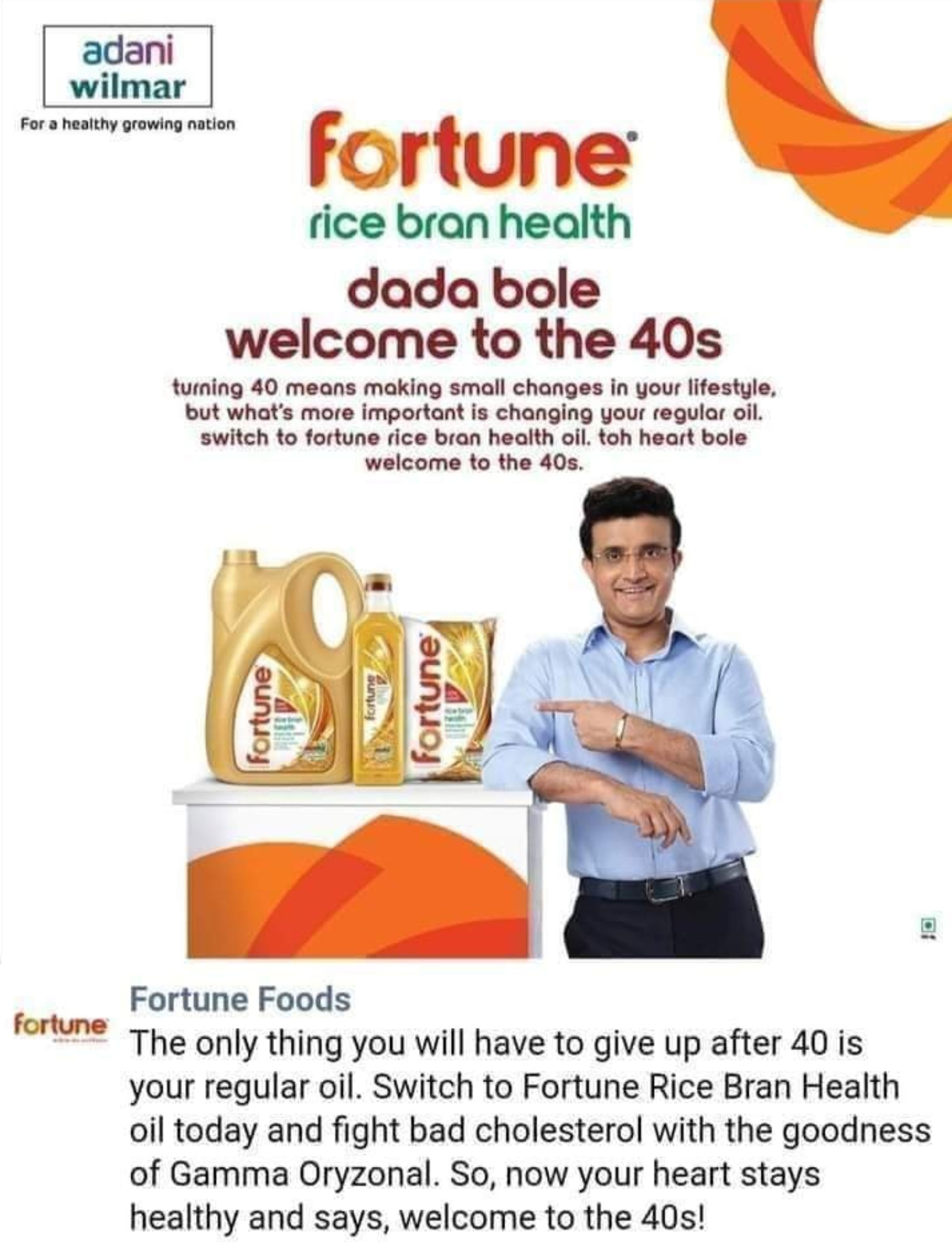
Saurav Ganguly, the price of Kolkata, former Indian test cricket captain, was responsible for building Indian cricket from the abyss of 2000 to what it is today. The post is not about cricket, but about the cooking oil he endorsed, his mild heart attack, trolling by individuals on social media.
It is unfortunate that our idol had a heart attack and as we had prayed, he has recovered quickly after Angioplasty. The moment news broke out about his heart attack, people remembered the product/brand he endorsed. The fortune brand refined rice bran oil marketed by Adani Wilmar, advertised by agency Oglivy and Mather that claims the oil to be heart healthy. Why did he get heart attack despite being a sports person at highest level and at a young age of 48?
At one level, it is unfair to target Saurav Ganguly or the brand Fortune for his present health status. Brand only claims that the oil is good for heart and never claims that no matter what you do, you will never get heart attack. Saurav on his part, despite following a healthy lifestyle had to get a heart attack. I promote coconut oil for cooking and hair but I am bald and I am not necessarily the healthiest. So, coconut oil or the brand Cocoguru is not responsible for it. But for that we need to think fairly, which doesn’t happen in the emotional world of advertising.
Should Saurav Ganguly promote the product/brand?
Saurav Ganguly has worked hard as a professional cricketer to achieve success he has and rise to be a nationally adored celebrity. He has borne the cost of being a celebrity also. It is only wise he uses his reach to commercially encash on his popularity. But people are only questioning his responsibility in choosing the products he has endorsed. I believe he must personally use it, must have done some basic research and liked it before endorsing it to others. I know Harsha Bhogle for one does the due diligence before endorsing a brand. A few cricketers like Hashim Amla don’t sport Castle Lager logo on their shirt though it is their national sponsor as it is a liquor brand. With financial commitments it is easy to endorse brands that pay the most. Sportsmen are also under the pressure to make money fast as they have limited time appeal mostly in their playing days when they are playing well.
Should the brand select Saurav Ganguly for the campaign?
The campaign is about being healthy even after crossing 40 years of age and Ganguly is a correct choice for it as he is an icon for all people across the country who are of that generation. But the brand’s advertising agency must have worked with Ganguly to find out if he really is a user of the product, does the product really promote heart health? For any long term relationship to work, deal must work fairly both ways.
Risk of having a personality endorse a brand
Nobody would have anticipated Ganguly suffering from heart attack, so the brand must be excused for not covering this risk. There have been backlashes in the past for celebrities taking political positions like Amir Khan, Deepika Padukone, Swara Bhasker etc and users have boycotted the products they have endorsed. Celebrities are humans after all and have their right to opinion and expression, but it runs the risk of their followers liking it or not. Using celebrities gives brands immediate benefits of reach and liking, but it also carries its risk.
Is there any logic, head or heart in promoting refined oils as healthy?
The low cost of refined oil gives its marketers the wide mass market for consumption and hence the marketing budget to spend enticing the users to switch to it. Refined oils may be devoid of impurities like free fatty acids, bad odour, extra colour, solid particles and moisture. But why did the oil have impurities in the first place? Because they were inferior grade oils that were made acceptable through refining. Crude, raw, filtered, cold pressed oils are extracted from superior grade oil seeds and ready of consumption as it is, without having to undergo refining. But they are expensive because such oil seeds are expensive. Crude oils are healthy but their manufacturers don’t have the marketing muscle to promote it to masses. Masses can’t afford it either. Masses usually succumb to dubious claims by advertisers especially if it comes from a celebrity.

